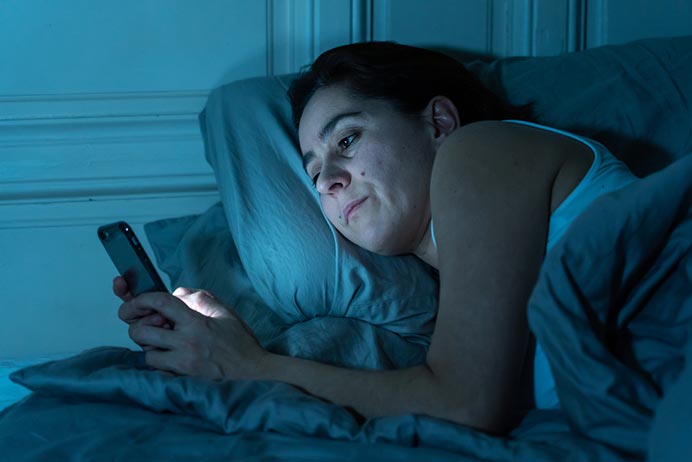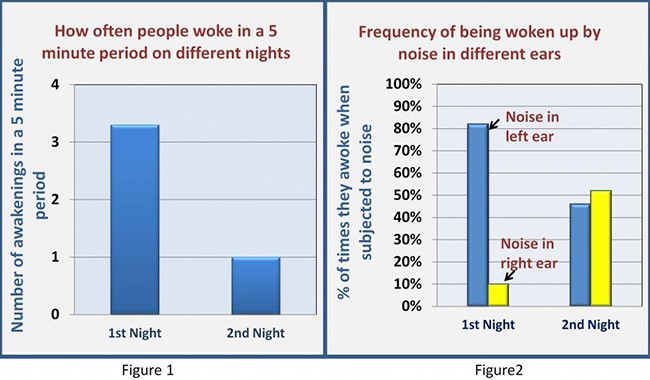
Do you always seem to lose sleep when you stay over at a friend’s place or on the first night in a hotel, no matter how luxuriously perfect the bed feels?
If that’s the case, you’re most definitely not alone. In fact, you have at least one person to share the problem with – me!
This always seems to happen to me on the first night in an unfamiliar bedroom. So I know how frustrating it can be, especially if you have something important happening the next day.
I used to think it was simply due to unfamiliarity with the new surroundings or perhaps some excitement about being on the road again.
However, some interesting research into what’s sometimes called the ‘first night effect’ suggests a deeper explanation.
First Night Effect
When people spend a couple of nights in a specialist sleep clinic to check for sleep disorders, sleep experts have long known they can’t always rely on the first night’s data. The patients themselves sometimes say they can’t sleep in a way that mirrors what’s happening at home.
Back in 2014, researchers from the University of Budapest looked into this first night effect more closely. They studied 27 people in a laboratory setting and found significant differences in sleep quality between the first and second nights.
On the first night, people took longer to fall sleep, got less total sleep, woke up more often, and had less of the important restorative phases of sleep.
12 of the people studied also routinely suffered from nightmares. The researchers found that this group had even greater differences in the sleep parameters between the two nights.
The evolutionary theory
Why is it then that so many people struggle to sleep in a different bedroom, even if they normally sleep well at home?
One theory is that poor sleep on the first night in a new environment is a natural, evolutionary self-defense mechanism.
It’s argued that your brain decides that a new place can mean extra danger to you, so a part of your brain stays alert. You could say it’s keeping watch while you rest.
In ancient times this could have been vital for self-preservation. Moving from a safe spot to a new and unfamiliar area could increase the danger from wild animals or other humans. This probably required early humans to be much more alert, even when sleeping.
Research
In April 2016, researchers published a study of the first night effect using advanced neuroimaging techniques and polysomnography.
They studied 35 people sleeping in new environments, measuring brain activity on the first night and subsequent nights.
They focused their attention on the slow (Delta) wave part of the sleep cycle. This part of the sleep cycle is when we’re in our deepest sleep, and is also an essential restorative phase of sleep.
One half of the brain stays more alert
The researchers found that the left side of the brain appeared to stay more active than the right side on the first night. However, in the following nights there was little or no difference in activity between the two sides.
The brain also reacted more to external noise on the first night, resulting in more wakings and a faster behavioral reaction to the noise stimulus.
To test this, while people were sleeping the researchers played noise into their ears. On average they woke up more than three times more often on the first night than on the second.
Figure 1 below shows the average number of awakenings over a five minute period on the first night and then on the second night.

The researchers also tested what would happen if they only played the sound into the right or left ear of the sleeping people.
Figure 2 above illustrates that there was a big difference in the percentage of times people woke up on the first night, depending on which ear the noise was played into. There was no significant difference on the following night for both ears.
The researchers also observed that the reaction time between hearing a noise and waking was significantly faster on the first night.
So perhaps after the first night without any real threats in the sleep environment, the brain can relax and let you sleep more soundly.
In line with the previous research, the team found that the average time it took people to fall asleep was much longer on the first night than subsequent nights.
The research suggests that the subjects were naturally staying more alert on the first night, perhaps so that they could wake up more easily if needed.
Unihemispheric sleep
Interestingly, scientists have found that some marine mammals such as whales, dolphins and seals, as well as some bird species, have what’s called unihemispheric sleep, in which one side of the brain sleeps while the other remains alert.
This serves particular needs, such as allowing migrating birds to fly continuously for long periods of time, for marine animals to surface to breathe, and perhaps to stay alert to predators in some cases.
This level of unihemispheric sleep was long thought not to occur in humans. You were either asleep or awake, so to speak.
In 2019, a team of researchers further explored the idea that something similar might be happening in people during the first night effect. They discovered that the two brain hemispheres weren’t always as synchronized as previously though.
As the study leader explained in phys.org:
Since different sleep stages are associated with different degrees of synchronization, I believe that some weak form of uni-hemispheric sleep, i.e., different sleep depth of the two hemispheres, can well occur in humans, not only in whales, dolphins, seals, and migratory birds
Eckehard Schöll
Back to my own experience, and I’m pretty sure that if this is what’s happening when I’m on holiday, it’s not due to migration or a need to breathe while swimming! So it’s back to the theory of my brain looking out for me while I sleep.
What can you do to sleep better on the first night in a new place?
I can’t help but wonder then if the level of security you feel in a hotel, friend’s house or holiday rental would make a difference.
Maybe I’ll string up some empty cans by the front door next time to see if that can reassure my half-asleep brain!
In all seriousness, there isn’t a lot of research into how we can get around the first night effect. In fact, I haven’t found any that explored methods to deal with this specific issue.
Having said that, I’ve personally tried a few things to see if they might help, with varying degrees of success.
Perhaps the most success I’ve had has come from taking my own pillow with me. This might not always be practical when going on holiday, but for shorter trips that you take in your car, it’s no hassle to take a pillow with you.
Another technique that helps is to make sure I’m really tired, which for me means being both physically and mentally tired. So if I’m staying away from home, I like to try and get a good workout in at some point during the day if possible.
I’m also quite diligent with my bedroom check when I get there. That means that rather than just accepting whatever condition I find the bedroom, I move things around if I don’t like the way the room is organized.
I also check the temperature, turning the heating up or opening a window as appropriate. If I don’t like the bedding, I’ll see what else is available.
Finally, I try to stick to my usual sleep schedule and bedtime routine. There’s no guarantee that these, or any other techniques, will override our brain’s desire to keep watch. But I don’t think there’s any harm in trying, especially as these are good sleep hygiene steps to take anyway.
Your views
Have you noticed this first night effect? Perhaps you have a technique that helps you sleep when traveling? Let me know in the comments!

I have this all the time. I’m now at my brother’s and cannot sleep but I know it will be the 1st night only even tho I’ve slept here many times, no matter where I go: family: holidays: hotels it’s always the 1st night, which makes me very tired the next day…
Hi. I found your article interesting. I actually suffer with a fear of sleeping in a new place.
Do you actually get no sleep in a new place?
How about the opposite? I have been struggling with my urge to change the place of sleep every once in a while. Every first night in a new place is a blessing to me, since I can finally fall asleep, I don’t wake up at night and I don’t have nightmares. Once I get used to a new home – I feel that I need to spend a night or two elsewhere again (might be another room, or someone else’s house)
Hi Linda
Thanks for your comment. It’s very interesting, but not something I know much about as it’s the opposite to my own experience, as you point out! How long do you usually find it takes before the urge happens? Is it less if you take holidays or trips from time to time? Maybe it’s an expression of the old ‘itchy feet’ syndrome some travellers (like me) get from time to time.
Regards
Ethan
One thought I had is perhaps for you the threat is in the familiarity and not the newness of a new place,perhaps.
Hi Ethan,
I am so relieved after reading your article. My girlfriend rented a new apartment a week ago and she asked me to come over to spend the night with her. I noticed that she slept earlier than me which was unusual whenever she visited me. Finally, I fell asleep and had a nightmare. I woke up and realized I have just slept for 40mins. After an hour I fell asleep and again another nightmare. It was so scary I had to check up the internet. Now I know the reason! Thank you.
Hi Austin
Thanks for your comment. I’m glad the article was useful to you. Hopefully, you’ll learn to sleep there peacefully soon enough.
Regards
Ethan
Interesting reading for sure. I experienced the same effects when I slept in a new environment. I had to take a sleep aid just for my mind to rest. What the article said about being alert to sounds, I experienced that also. The curtain was touching the lamp shade and it was a gentle swishing sound and that was disturbing to me. It was so distracting that I had to get up and move the night table away from the curtain. Really enjoy the article.
Hi Deborah
Thanks for your comment, and compliment. I’m glad you enjoyed the article! I’m the same with even gentle sounds – it doesn’t need to be much to keep me awake in a new place. For me, it’s the unfamiliarity of the sound, not the volume, that bothers me.
Regards
Ethan
hey ethan!
i have noticed the first-night effect. what helps me is inspecting the new room. i mean i try to really take it in. interact with most of the objects, look at them, touch them, mark my territory in a way.
thus feeding the part of my brain which stays alert and which thinks its in danger.
id like to come back to this site and read/talk some more when i find more time. <3
Hi Dušan
Thanks for your comment and your very interesting ideas. It sounds like a very good way to tackle the issue. I can totally see how that might help put the brain at ease, at least a little.
Regards
Ethan